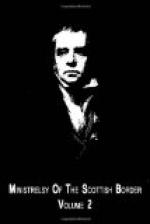[Footnote A: This odd name Froissart gives to the famous Mahomet, emperor of Turkey, called the Great.]
Such was the readiness, with which, in those times, heroes put their lives in jeopardy, for honour and lady’s sake. But I doubt whether the fair dames of the present day will think, that the risk of being burned, upon every suspicion of frailty, could be altogether compensated by the probability, that a husband of good faith, like John de Carogne, or a disinterested champion, like Hugh le Blond, would take up the gauntlet in their behalf. I fear they will rather accord to the sentiment of the hero of an old romance, who expostulates thus with a certain duke:—
Certes, sir duke, thou doest unright,
To make a roast of your daughter bright;
I wot you ben unkind.
Amis and Amelion.
I was favoured with the following copy of Sir Hugh le Blond, by K. Williamson Burnet, Esq. of Monboddo, who wrote it down from the recitation of an old woman, long in the service of the Arbuthnot family. Of course the diction is very much humbled, and it has, in all probability, undergone many corruptions; but its antiquity is indubitable, and the story, though indifferently told, is in itself interesting. It is believed, that there have been many more verses.
SIR HUGH LE BLOND.
The birds sang sweet as ony bell,
The world had not their make,
The queen she’s gone to her chamber,
With Rodingham to talk.
“I love you well, my queen, my dame,
“’Bove land and rents
so clear
“And for the love of you, my queen,
“Would thole pain most severe.”
“If well you love me, Rodingham,
“I’m sure so do I thee:
“I love you well as any man,
“Save the king’s fair
bodye.”




